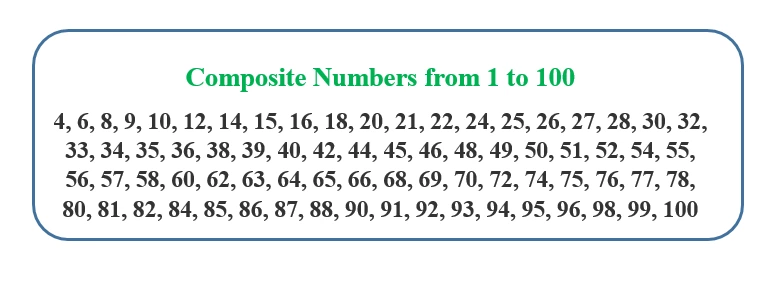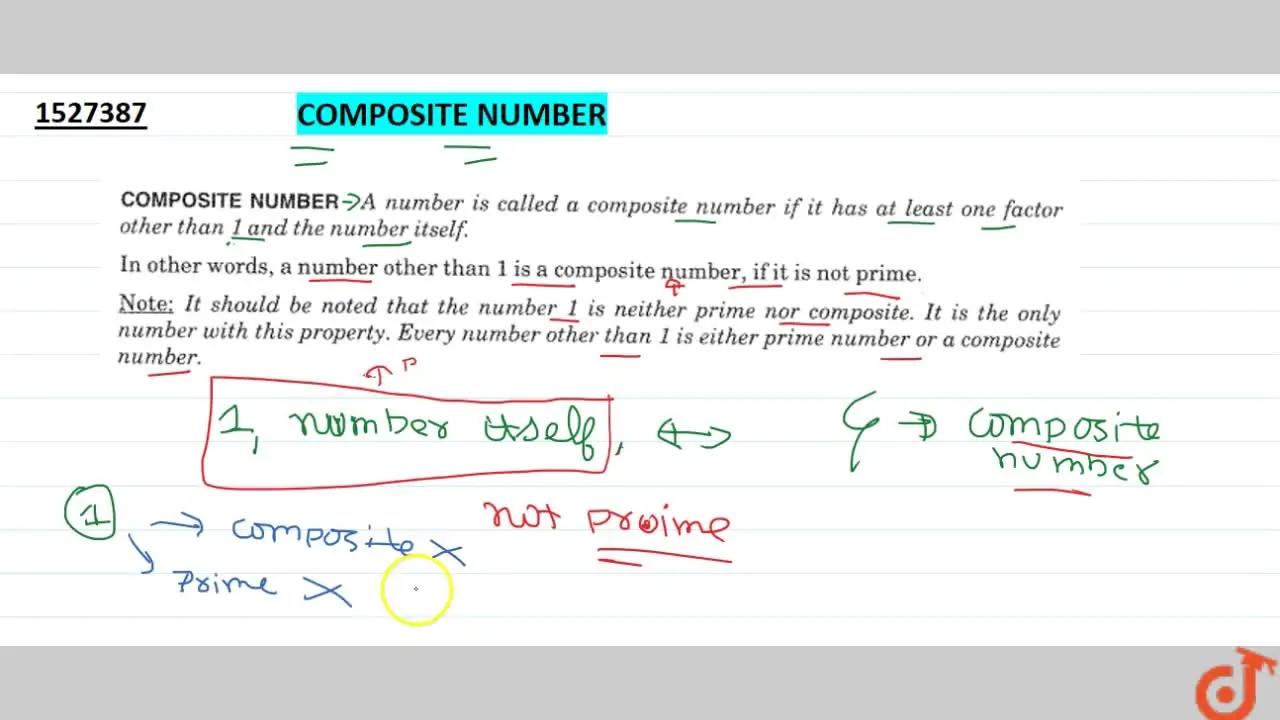Composite number
Composite Number
Composite numbers have factors other than 1 and the number itself. It is also referenced as composites. In Number System, the integers can be classified into two types to be specific, positive integers and negative integers. These integers can be additionally classified into numerous types such as even and odd numbers, prime and co-prime numbers, composites, and so on. Composites are the opposite form of the prime numbers.
In this article, we will look at the composite number in Maths, the difference between composite and prime numbers, and the smallest composite number alongside its types, examples and list of composites from 1 to 100.
What is a Composite Number?
The integers formed by multiplying the two smallest positive integers and contains at one divisor except 1 and itself is known as composite numbers. Any number that has multiple factors and is not a prime number is composite. This is the basic difference between composite numbers and prime numbers. Let us adapt now how to figure them out.
How to find the Composite Number?
The procedures to determine whether a given number is prime or composite is as follows:
• Find all the factors of the positive whole number
• A number is said to be prime in the event that it has just two factors, 1 and itself.
• If the number has multiple factors (more than two), then it is a composite number.
The number zero (0) is neither a prime number nor a composite number. The number 1 is known as the smallest positive whole number, and its factor is a number itself. Sometimes divisibility rule helps to decide if the number is a composite or prime number. The numbers that can be divided by 2, and leave the remainder zero is called even number. Sometimes, all the even number which are higher than 2 are considered as composite numbers.
Types of Composite Numbers
There are two major types of composite numbers:
• Composite Odd Numbers
• Composite Even Numbers
Composite Odd Numbers
All the odd integers that are not prime numbers are considered as composite odd numbers. Some composite odd numbers are 9, 15, 21, 25, 27, 33, and so forth.
Composite Even Numbers
All the even integers that are not prime numbers are composite even numbers. Some composite odd numbers are 4, 6, 8, 10, 12, 14, 16, and so forth.
Composite Numbers List from 1 to 100
Below there is a list of the composite numbers from 1 to 100. Students can reference the composite numbers from this list and furthermore attempt to write the composite numbers past 100 for practice.

What is the Smallest Composite Number?
The number 4 has multiple factors, not just 1 and the number 4 itself. The dividing factors of the number 4 are 1,2,4. So this number satisfies the state of a composite number as referenced previously. After number 4, the number 6 is the next composite number, which has factors 1, 2, 3 and 6.
Henceforth, 4 is the smallest composite number.
Related Videos:
Difference between Composite Numbers and Prime Numbers
The difference between the composite numbers and the prime numbers are noted below:
Composite Numbers
Prime Numbers
It has more than two divisors (1 and itself).
It can be divided by 1 and the number itself only, thus have only two divisors
It can be expanded as the product of two or more numbers
It can only be expanded as a product of two numbers
Example: 6 has factors are 1, 2 and 3
Example: 7 has factors are 1 and 7
Prime Factorisation of First 50 Composite Numbers
We have compiled the list of composite positive integers from 1 to 50 with their prime factorisation. You can get an idea of how the composites are factorised in prime numbers. Check the following table for better understanding. With the assistance of this table, you can also discover the composites past 50 with their prime factorisation.
Composite Numbers
Prime Factorisation
4
2 × 2
6
2 × 3
8
2 × 2 × 2
9
3 × 3
10
2 × 5
12
2 × 2 × 3
14
2 × 7
15
3 × 5
16
2 × 2 × 2 × 2
18
2 × 3 × 3
20
2 × 2 × 5
21
3 × 7
22
2 × 11
24
2 × 2 × 2 × 3
25
5 × 5
26
2 × 13
27
3 × 3 × 3
28
2 × 2 × 7
30
2 × 3 × 5
32
2 × 2 × 2 × 2 × 2
33
3 × 11
34
2 × 17
35
5 × 7
36
2 × 2 × 3 × 3
38
2 × 19
39
3 × 13
40
2 × 2 × 2 × 5
42
2 × 3 × 7
44
4 × 11
45
3 × 3 × 5
46
2 × 23
48
2 × 2 × 2 × 2 × 3
49
7 × 7
50
2 × 5 × 5
Important Chapters:

Composite Numbers
Prime Numbers
It has more than two divisors (1 and itself).
It can be divided by 1 and the number itself only, thus have only two divisors
It can be expanded as the product of two or more numbers
It can only be expanded as a product of two numbers
Example: 6 has factors are 1, 2 and 3
Example: 7 has factors are 1 and 7
Composite Numbers
Prime Factorisation
4
2 × 2
6
2 × 3
8
2 × 2 × 2
9
3 × 3
10
2 × 5
12
2 × 2 × 3
14
2 × 7
15
3 × 5
16
2 × 2 × 2 × 2
18
2 × 3 × 3
20
2 × 2 × 5
21
3 × 7
22
2 × 11
24
2 × 2 × 2 × 3
25
5 × 5
26
2 × 13
27
3 × 3 × 3
28
2 × 2 × 7
30
2 × 3 × 5
32
2 × 2 × 2 × 2 × 2
33
3 × 11
34
2 × 17
35
5 × 7
36
2 × 2 × 3 × 3
38
2 × 19
39
3 × 13
40
2 × 2 × 2 × 5
42
2 × 3 × 7
44
4 × 11
45
3 × 3 × 5
46
2 × 23
48
2 × 2 × 2 × 2 × 3
49
7 × 7
50
2 × 5 × 5
Similar Questions
In a set of prime and composite numbers, the composite numbers are twice the number of prime numbers and the average of all the number of the set is 9. If the number of prime numbers and composite numbers are exchanged then the average of the set of numbers is increased by 2. If during the exchange of the numbers the average of the prime numbers and composite numbers individually remained constant, then the ratio of the average of composite numbers to the average of prime numbers (initially) was :
View SolutionIn a set of prime and composite numbers, the composite numbers are twice the number of prime numbers and the average of all the number of the set is 9. If the number of prime numbers and composite numbers are exchanged then the average of the set of numbers is increased by 2. If during the exchange of the numbers the average of the prime numbers and composite numbers individually remained constant, then the ratio of the average of composite numbers to the average of prime numbers (initially) was :
View SolutionA fair die is rolled once. Statement 1: the probability of getting a composite number is 1/3. Statement2: There are three possibilities for the obtained number (i) the number is a prime number, (ii) the number is a composite number, and (iii) the number is 1. Hence, probability of getting a prime number is 1/3.
View SolutionIf a dice is rolled, then find the probability of getting a composite number.
The following steps are involved in solving the above problem. Arrange them in sequential order.
(A) The possible composite number when a dice is rolled are 4 and 6. When a dice is rolled, the possible outcomes are 1, 2, 3, 4, 5, 6.
(B) The required probability =13
(C) The probability of getting a composite number =Number of favourable outcomesTotal number of outcomes=26View SolutionIf a dice is rolled, then find the probability of getting a composite number.
The following steps are involved in solving the above problem. Arrange them in sequential order.
(A) The possible composite number when a dice is rolled are 4 and 6. When a dice is rolled, the possible outcomes are 1, 2, 3, 4, 5, 6.
(B) The required probability =13
(C) The probability of getting a composite number =Number of favourable outcomesTotal number of outcomes=26View SolutionWhich of the following numbers is composite ?
View Solution


